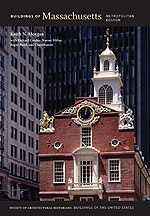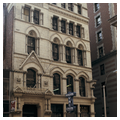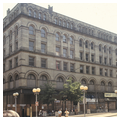You are here
China Trade Building (Boylston Building) and Young Men's Christian Union Building
Carl Fehmer's massive Renaissance Revival block for the Boylston Market Association replaced an earlier market house by Charles Bulfinch. The Continental Clothing Company, a large retail firm in close proximity to several rail lines and the garment district, originally occupied most of this severe, imposing Nova Scotia sandstone building. The architects for its 1987 adaptive reuse as the China Trade Building created a multistoried atrium with balconies and stairways surrounding the exposed cast-iron columns.
Behind this block, near Tremont Street, stands the former Young Men's Christian Union Building. Now shorn of its tower, the ornate structure survives as the last of three Venetian Gothic buildings that stood at the intersection of Tremont and Boylston streets.
Writing Credits
If SAH Archipedia has been useful to you, please consider supporting it.
SAH Archipedia tells the story of the United States through its buildings, landscapes, and cities. This freely available resource empowers the public with authoritative knowledge that deepens their understanding and appreciation of the built environment. But the Society of Architectural Historians, which created SAH Archipedia with University of Virginia Press, needs your support to maintain the high-caliber research, writing, photography, cartography, editing, design, and programming that make SAH Archipedia a trusted online resource available to all who value the history of place, heritage tourism, and learning.





